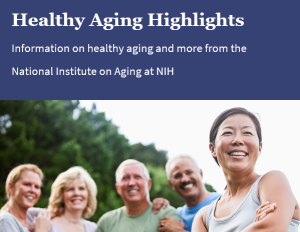Medicines are intended to help us live longer and healthier, but taking medicines the wrong way or mixing certain drugs and supplements can be dangerous. Older adults often have multiple medical conditions and may take many medicines, which puts them at additional risk for negative side effects. Read on to learn how to safely take and keep track of all your medicines.
https://www.nia.nih.gov/health/medicines-and-medication-management/taking-medicines-safely-you-age?utm_source=nia-eblast&utm_medium=email&utm_campaign=healthyaging-20240415#new
A new study shows when mitochondrial DNA is blocked in aged mice, signs of inflammation are lowered, bone health is improved, and overall frailty is reduced.
https://www.nia.nih.gov/news/mitochondrial-dna-release-drives-cellular-senescence-and-inflammation-mice?utm_source=nia-eblast&utm_medium=email&utm_campaign=news-20240311
It’s never too late to start making healthy food choices! Eating well can help you maintain a healthy weight, get the nutrients you need, and lower your risk of some chronic diseases.
https://www.nia.nih.gov/health/healthy-eating-nutrition-and-diet/healthy-meal-planning-tips-older-adults
A recent NIA-funded study found that socially isolated adults scored higher on cognitive tests after participating in weekly online conversations designed to stimulate brain regions associated with memory, executive function, and abstract thought.
https://www.nia.nih.gov/news/online-conversations-show-potential-cognitive-benefit-socially-isolated-older-adults?utm_source=nia-eblast&utm_medium=email&utm_campaign=news-20240325
NIA-funded scientists developed a clinical prediction algorithm and biomarker panel that may help health care providers identify patients with rapidly progressive dementia.
https://www.nia.nih.gov/news/scientists-create-tools-identify-patients-potentially-treatable-forms-rapidly-progressive?utm_source=nia-eblast&utm_medium=email&utm_campaign=news-20240325

